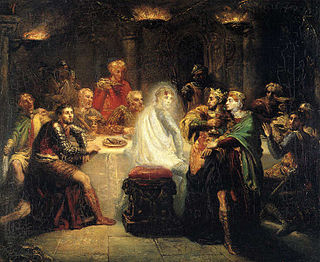
LordBanquo, the Thane of Lochaber, is a semi-historical character in William Shakespeare's 1606 play Macbeth. In the play, he is at first an ally of Macbeth and they meet the Three Witches together. After prophesying that Macbeth will become king, the witches tell Banquo that he will not be king himself, but that his descendants will be. Later, Macbeth in his lust for power sees Banquo as a threat and has him murdered by three hired assassins; Banquo's son, Fleance, escapes. Banquo's ghost returns in a later scene, causing Macbeth to react with alarm in public during a feast.
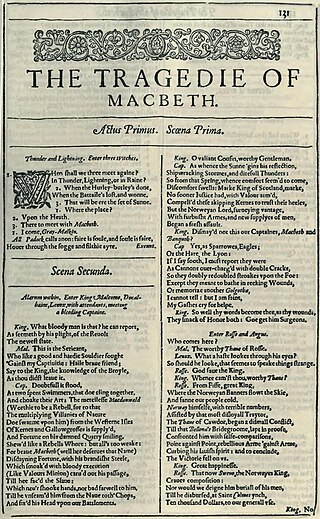
Macbeth is a tragedy by William Shakespeare. It is thought to have been first performed in 1606. It dramatises the damaging physical and psychological effects of political ambition on those who seek power. Of all the plays that Shakespeare wrote during the reign of James I, Macbeth most clearly reflects his relationship with King James, patron of Shakespeare's acting company. It was first published in the Folio of 1623, possibly from a prompt book, and is Shakespeare's shortest tragedy.

Draco Lucius Malfoy is a fictional character and a major antagonist in J. K. Rowling's Harry Potter series. He is a student in Harry Potter's year belonging in the Slytherin house. He is frequently accompanied by his two cronies, Vincent Crabbe and Gregory Goyle, who act as henchmen. Draco is characterised as a cowardly bully who tricks and hurts people to get what he wants; he is also a cunning user of magic. He was played by Tom Felton in the Harry Potter film series.
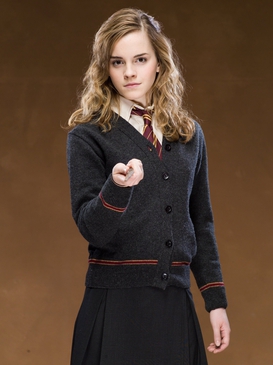
Hermione Jean Granger is a fictional character in J. K. Rowling's Harry Potter series. She first appears in the novel Harry Potter and the Philosopher's Stone (1997), on the Hogwarts express as a first year student on her way to Hogwarts. After Harry and Ron save her from a mountain troll in the girls' restroom, she becomes best friends with them and often uses her quick wit, deft recall, and encyclopaedic knowledge to lend aid in dire situations. Rowling has stated that Hermione resembles herself as a young girl, with her insecurity and fear of failure.

Prof. Albus Percival Wulfric Brian Dumbledore is a fictional character in J. K. Rowling's Harry Potter series. For most of the series, he is the headmaster of the wizarding school Hogwarts. As part of his backstory, it is revealed that he is the founder and leader of the Order of the Phoenix, an organisation dedicated to fighting Lord Voldemort, the main antagonist of the series.

Ralph Nathaniel Twisleton-Wykeham-Fiennes is an English actor, film producer, and director. He graduated from RADA in 1985. A Shakespeare interpreter, Fiennes excelled onstage at the Royal National Theatre before having further success at the Royal Shakespeare Company. Widely regarded as one of Britain's most well-known and popular actors, he has received various accolades, including a BAFTA Award and a Tony Award, as well as nominations for two Academy Awards and an Emmy Award.

Dumbledore's Army is a fictional student organisation in J. K. Rowling's Harry Potter series that is founded by the main characters, Harry Potter, Ron Weasley and Hermione Granger, to stand up against the regime of Hogwarts High Inquisitor Dolores Umbridge, as well as to learn practical Defence Against the Dark Arts. It was founded in the fifth book, Harry Potter and the Order of the Phoenix.
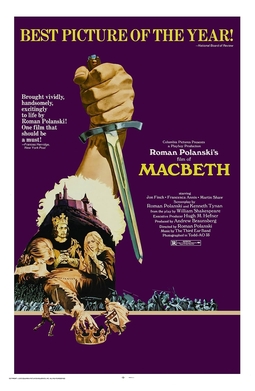
Macbeth is a 1971 historical drama film directed by Roman Polanski, and co-written by Polanski and Kenneth Tynan. A film adaptation of William Shakespeare's tragedy of the same name, it tells the story of the Highland lord who becomes King of Scotland through treachery and murder. Jon Finch and Francesca Annis star as the title character and his wife, noted for their relative youth as actors. Themes of historic recurrence, greater pessimism and internal ugliness in physically beautiful characters are added to Shakespeare's story of moral decline, which is presented in a more realistic style.

The Scottish Play and the Bard's play are euphemisms for William Shakespeare's Macbeth. The first is a reference to the play's Scottish setting, the second a reference to Shakespeare's popular nickname. According to a theatrical superstition, called the Scottish curse, speaking the name Macbeth inside a theatre, other than as called for in the script while rehearsing or performing, will cause disaster. On top of the aforementioned alternative titles, some people also refer to the classical tragedy as Mackers for this reason. Variations of the superstition may also forbid quoting lines from the play within a theatre except as part of an actual rehearsal or performance of the play.
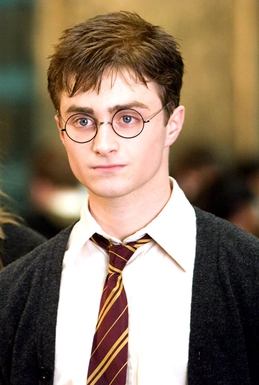
Harry James Potter is a fictional character and the titular protagonist in J. K. Rowling's series of eponymous novels. The majority of the books' plot covers seven years in the life of the orphan Harry, who, on his eleventh birthday, learns he is a wizard. Thus, he attends Hogwarts to practise magic under the guidance of the kindly headmaster Albus Dumbledore and other school professors along with his best friends Ron Weasley and Hermione Granger. Harry also discovers that he is already famous throughout the novel's magical community, and that his fate is tied with that of Lord Voldemort – the internationally feared Dark Wizard and murderer of his parents, James and Lily Potter. The book and film series revolve around Harry's struggle to adapt to the wizarding world and defeat Voldemort.
Fleance is a figure in legendary Scottish history. He was depicted by 16th-century historians as the son of Lord Banquo, Thane of Lochaber, and the ancestor of the kings of the House of Stuart. Fleance is best known as a character in William Shakespeare's play Macbeth, in which the Three Witches prophesy that Banquo's descendants shall be kings. Some screen adaptations of the story expand on Fleance's role by showing his return to the kingdom after Macbeth's death.

Macbeth is a 1948 American historical drama directed by Orson Welles. A film adaptation of William Shakespeare's tragedy of the same name, it tells the story of the Scottish general who becomes the King of Scotland through treachery and murder. The film stars Welles in the lead role and Jeanette Nolan as Lady Macbeth.

Jamie Parker is an English actor and singer. He is best known for his role as Harry Potter in the original cast for the West End play Harry Potter and the Cursed Child, for which he received a Laurence Olivier Award for Best Actor in a Leading Role in a Play and a WhatsOnStage Award for Best Actor in a Play. He also received a nomination for a Tony Award for Best Actor in a Leading Role in a Play as a member of the original Broadway version.

The Three Witches, also known as the Weird Sisters or Wayward Sisters, are characters in William Shakespeare's play Macbeth. The witches eventually lead Macbeth to his demise, and they hold a striking resemblance to the three Fates of classical mythology. Their origin lies in Holinshed's Chronicles (1587), a history of England, Scotland and Ireland. Other possible sources, apart from Shakespeare, include British folklore, contemporary treatises on witchcraft as King James VI of Scotland's Daemonologie, the Witch of Endor from the Bible, the Norns of Norse mythology, and ancient classical myths of the Fates: the Greek Moirai and the Roman Parcae.

Noma Dumezweni is a South African-British actress. In 2006, she won the Laurence Olivier Award for Best Performance in a Supporting Role for her performance as Ruth Younger in A Raisin in the Sun at the Lyric Hammersmith Theatre. In 2017, she won the Laurence Olivier Award for Best Actress in a Supporting Role for her performance as Hermione Granger in the original West End run of Harry Potter and the Cursed Child; she reprised the role for the show's original Broadway run and, in 2018, was nominated for the Tony Award for Best Featured Actress in a Play.
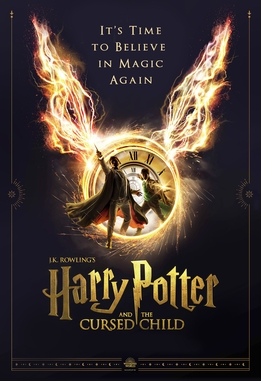
Harry Potter and the Cursed Child is a play written by Jack Thorne from an original story written by J. K. Rowling, Thorne and John Tiffany. The story is set nineteen years after the events of the 2007 novel Harry Potter and the Deathly Hallows by Rowling. It follows Albus Severus Potter, son of Harry Potter, who is now Head of the Department of Magical Law Enforcement at the Ministry of Magic. When Albus arrives at Hogwarts, he gets sorted into Slytherin, and fails to live up to his father's legacy, making him resentful of his father. Rowling has referred to the play as "the eighth Harry Potter story".
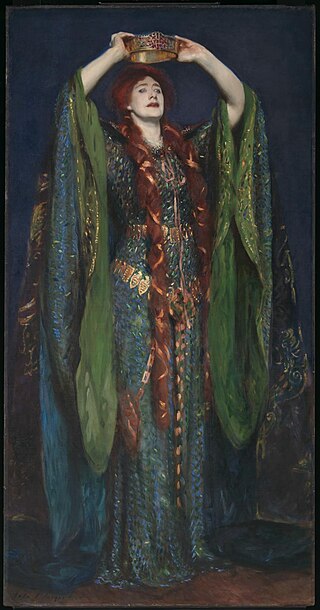
The tragic play Macbeth by William Shakespeare has appeared and been reinterpreted in many forms of art and culture since it was written in the early 17th century.

Neville Longbottom is a fictional character in J. K. Rowling's Harry Potter book series. He is described as a round-faced Gryffindor student in the central character Harry Potter's year. Throughout the series, Neville is often portrayed as a bumbling and disorganised character, and a rather mediocre student, though he is highly gifted at Herbology. However, the character's personality appears to undergo a transition after he joins Dumbledore's Army in Harry Potter and the Order of the Phoenix. The encouragement he receives gives him confidence in his magical abilities, turning him into a more competent wizard. Eventually, Neville becomes the leader of Dumbledore's Army during Harry, Ron and Hermione's absence searching for Horcruxes. Neville is instrumental in the downfall of Lord Voldemort and eventually destroys the final Horcrux, which allows Harry to defeat The Dark Lord once and for all. Neville is portrayed in the film adaptations by Matthew Lewis.

Cedric Diggory is a fictional character in J. K. Rowling's Harry Potter series. He is one of the main characters in the fourth book, Harry Potter and the Goblet of Fire, as he represents Hogwarts School of Witchcraft and Wizardry in the Triwizard Tournament, alongside Harry Potter. Cedric is murdered by Peter Pettigrew on Lord Voldemort's orders during Voldemort's resurrection in Little Hangleton.


















